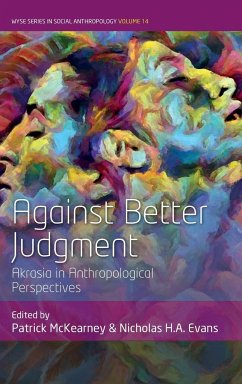Anthropologists have long explained social behaviour as if people always do what they think is best. But what if most of these explanations only work because they are premised upon ignoring what philosophers call 'akrasia' - that is, the possibility that people might act against their better judgment? The contributors to this volume turn an ethnographic lens upon situations in which people seem to act out of line with what they judge, desire and intend. The result is a robust examination of how people around the world experience weaknesses of will, which speaks to debates in both the anthropology of ethics and moral philosophy.
Hinweis: Dieser Artikel kann nur an eine deutsche Lieferadresse ausgeliefert werden.
Hinweis: Dieser Artikel kann nur an eine deutsche Lieferadresse ausgeliefert werden.








